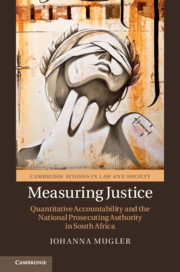 Measuring Justice
Measuring Justice Book contents
- Measuring Justice
- Cambridge Studies in Law and Society
- Measuring Justice
- Copyright page
- Dedication
- Contents
- Acknowledgements
- Abbreviations
- Legislation – Statutes
- Introduction
- I From Apartheid Administrators to Lawyers of the People: A History of Accountability inside the South African Prosecution Authority (1948–2018)
- 2 Ethnographic Research in a Multi-Local Organisation: Access, Challenges and Methods
- 3 ‘Stats Talk’ and Alternative Expressions of Accountability: NPA Lower Court Prosecutors at Work
- 4 No Fear of Numbers: Reactivity and the Political Economy of NPA Performance Measurement
- 5 At the Top of the NPA
- 6 Lies, Damned Lies and Statistics
- Concluding Remarks
- Bibliography
- Index
- Cambridge Studies in Law and Society
Concluding Remarks
Published online by Cambridge University Press: 22 June 2019
- Measuring Justice
- Cambridge Studies in Law and Society
- Measuring Justice
- Copyright page
- Dedication
- Contents
- Acknowledgements
- Abbreviations
- Legislation – Statutes
- Introduction
- I From Apartheid Administrators to Lawyers of the People: A History of Accountability inside the South African Prosecution Authority (1948–2018)
- 2 Ethnographic Research in a Multi-Local Organisation: Access, Challenges and Methods
- 3 ‘Stats Talk’ and Alternative Expressions of Accountability: NPA Lower Court Prosecutors at Work
- 4 No Fear of Numbers: Reactivity and the Political Economy of NPA Performance Measurement
- 5 At the Top of the NPA
- 6 Lies, Damned Lies and Statistics
- Concluding Remarks
- Bibliography
- Index
- Cambridge Studies in Law and Society
Summary
Accountability, or the way people explain and justify specific social situations, ‘is part of the general fabric of human interchange’ (Strathern 2000a: 4). It is a concept of central importance to the understanding of social action (Garfinkel 1967: 1). Futhermore, public accountability is evidently required for good governance, redistributive justice and fair resource allocation as it can minimise unpredictability and arbitrariness and can control discretion (Dowdle 2006; Mashaw 2006). How quantitative forms of accountability shape the way people work and experience their accountability in different organisational fields is therefore an important social question worthy of (more) sustained investigation. This is especially the case when one considers that the pressure for quantitative evaluation and demands for quantitative accountability have been on the rise over the past two decades.
- Type
- Chapter
- Information
- Measuring JusticeQuantitative Accountability and the National Prosecuting Authority in South Africa, pp. 165 - 173Publisher: Cambridge University PressPrint publication year: 2019
